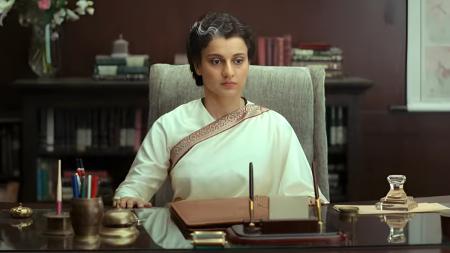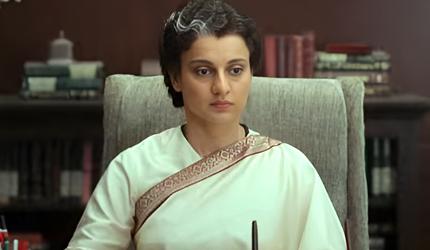Kangana Ranaut's decline as an actor feels complete, observes Utkarsh Mishra.

What would you, my fellow Indian, envision if I asked you to imagine a dramatic depiction of the sequence when Prime Minister Indira Gandhi declared war on Pakistan in 1971?
Whatever you picture, I'm certain it wouldn't involve Opposition leaders -- including Atal Bihari Vajpayee (even though he was a poet) -- breaking into song, thumping their desks in Parliament, and later being joined by Treasury Bench members.
Nor would it include the legendary General Sam Manekshaw singing along with his men in the War Room, thumping their chests, and saluting the Indian map. (Thankfully, Sam is not around to witness this.)
Yet, that is how Bharatiya Janata Party MP Kangana Ranaut portrays this chapter in Emergency, her biopic of India's first woman prime minister, finally released after a protracted battle with the censors.
It's surprising the censors didn't demand this scene be cut. The film leaves you grasping for the mot juste to describe it.
Nobody expects Bollywood to produce biographical or historical films on par with Lincoln (2012) or All the Way (2016).
But the industry has evolved enough to at least spare us the agony of seeing historical figures breaking into song during pivotal moments.
And what is with the deafening background score that sometimes even drowns out the dialogue?
It's futile to try separating fact from fiction in this film.
The performances are so superficial that they don't warrant a discussion of nuance, or the lack thereof.
Kangana Ranaut's decline as an actor feels complete.
In the age of social media, most of us have watched archival footage of Mrs Gandhi's interviews and speeches.
The resolute, decisive eyes and confident demeanor are glaringly absent in Ranaut's portrayal.
Instead, her character is almost always teary-eyed and lacking in confidence. It is not always necessary to burst into tears to convey that a character is grappling with deep internal struggle.
Ranaut's attempt at voice modulation to sound like Mrs Gandhi falls completely flat, much like Anupam Kher's portrayal of Dr Manmohan Singh in The Accidental Prime Minister. Her gestures often appear impulsive or abrupt, further detracting from the authenticity of the role.
The overdramatisation of historical events is almost unbearable. For instance, how do you depict Indira Gandhi regretting the excesses of the Emergency -- if she ever truly did?
Surely, making her see herself as a witch in the mirror wouldn't even make it to your top 10 ideas!
Sanjay Gandhi, played by Vishak Nair, is portrayed as the obvious villain.
While stories about his rash behaviour and short temper are well known, the film takes liberties by exaggerating his portrayal.
Anupam Kher as Jayaprakash Narayan and Shreyas Talpade as Atal Bihari Vajpayee are the film's saving grace though Talpade's performance doesn't quite live up to his full potential.
The only moment where the film appears to find its footing is when Ranaut's Indira visits a village in Bihar to meet peasants tormented by landlords. But even this fizzles out as the film abruptly jumps to her swearing-in in 1980, glossing over significant events in between.
Other crucial chapters of history are treated with similar haste.
The film opens with overt Nehru-baiting, depicting how he supposedly 'surrendered' to the Chinese.
This serves only to juxtapose Indira Gandhi's resolve to not 'look defeated' like her father, framing her as the kind of 'ruler' her grandfather envisioned. But this intent is undermined by Ranaut's portrayal of Mrs Gandhi, as described earlier.
Furthermore, if the goal was to emphasise Indira's determination to avoid surrendering like Nehru, the film could have included other significant historical episodes, such as the 1967 skirmishes at Nathu La or the integration of Sikkim into India in 1975, which left the Chinese second-guessing.
The film progresses to portray a weak and broken Indira Gandhi rising to power, her sinister attempts to consolidate it, her eventual regret and self-reflection and finally, her redemption through public engagement and martyrdom.
It is true that the Congress Syndicate chose Indira over Morarji Desai in 1966, believing her to be 'pliable and malleable'.
But as history shows, she proved them all wrong by breaking the party and putting the syndicate in its place. Unfortunately, this crucial detail is glaringly absent from the film.
The movie would have been far more impactful had it focused solely on the Emergency.
By attempting to cover the entirety of Mrs Gandhi's life and career, the film glosses over the very subject it claims to explore.
The details about the Emergency presented in the movie are already well-known: Buses and trains running on time, opposition leaders jailed, censorship imposed, and forced sterilisation campaigns.
The film does highlight the trigger for the Emergency -- the 1975 Allahabad high court verdict that found Indira Gandhi guilty of 'electoral malpractices' and barred her from holding elected office for six years.
But other significant details, such as the widespread JP Movement, the efforts to replace state governments in Gujarat and Bihar, intelligence inputs and Jayaprakash Narayan's call to the armed forces to disobey orders, are all glossed over.
There is, however, one silver lining.
The film emphasises that gagging the media, instilling fear in citizens to prevent them from speaking freely, and suppressing fundamental rights are reprehensible actions.
It subtly reminds viewers that beautifying cities or ensuring punctual trains cannot compensate for the erosion of constitutional and fundamental rights.
If nothing else, this is a valuable lesson for the audience to take away.
That said, even if the film chose to take the trajectory it did, it could have been executed far better. In fact, almost any other approach would have been an improvement.

